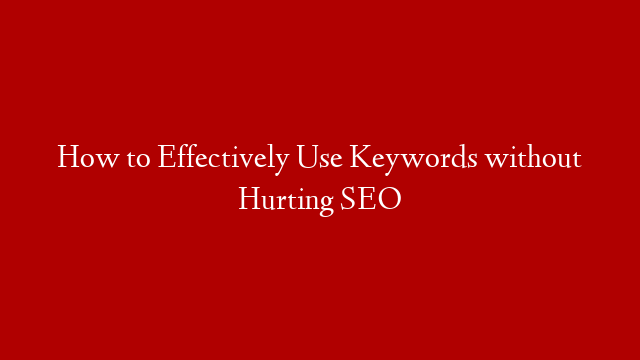How to Effectively Use Keywords without Hurting SEO
Hey everyone, Jerry with Vinci Digital. We are a digital marketing agency that helps brands create more measurable and sustainable opportunities for growth in their business. Today I want to talk to you about how to effectively use keywords in your content without hurting your visibility in search. That’s right, today we’re going to chat about SEO which is probably one of the more complex and misunderstood strategies in use today. Keep in mind, SEO changes so fast and has evolved so dramatically over the past 20 years that you shouldn’t feel some sort of way about not being fully “in the know” about best practices in 2022.
There has always been a big focus on the keywords you select to use in your page content and how those terms drive relevant traffic to your brand. However how those keywords should be used to benefit and not hurt your website’s visibility have changed dramatically over time. In the early days of SEO and modern search engines, keyword stuffing was a thing. Content creators would find one keyword they wanted to use to drive more traffic to a page or an entire website and shamelessly stuff that keyword as many times as possible into the page.
Keyword stuffing techniques are traditionally known as “black hat” marketing tactics and If you attempt to utilize any of these strategies it will most likely result in lower rankings.
So why would keyword stuffing impact your website’s visibility or rankings? While you might think “the more keywords I stuff into one page the better.” The opposite is actually true. When optimizing a page for search visibility we typically recommend optimizing one page for a single keyword or topic. Google also presents 4 strong arguments for why keyword stuffing will likely drive traffic away.
#1 Not keyword stuffing allows your brand to shine. 90% of search users don’t have a specific brand in mind when they search for information. Specifically mobile searches that are void of a specific brand have increased exponentially in the last two years. This means brands should focus on helping shoppers get the information they need to make a decision and enable them to purchase where and when they want to.
#2 Valuable content increases your chances of conversion. Like point #1 quality content that adds value to the user experience is essential. 80% of likely buyers purchase from companies that help answer their questions. In a scenario like this keyword stuffing serves no purpose to benefit the end user.
#3 Keyword stuffing increases your bounce rate – which means consumers are quick to bail if a site is sluggish or doesn’t provide real answers. The goal should be to give visitors access to valuable information when they need it most, make it easy to find, and once you have them on the page, do everything you can to help them enjoy the experience and stay as long as possible.
Lastly #4 People are always on the hunt, often taking days or weeks to make a purchasing decision. 84% of Americans are actively shopping at any given time. And the majority of them turn to search to help find what they need. They don’t have time to waste on pages and websites that are not built to serve their needs.
So it might sound like we are saying, avoid using keywords at all. Definitely NOT! Keywords are valuable and SEO is more critical than ever. You just have to follow best practices when using them. Keywords will help you thinking about how real users are looking for the things they need and how your products and services can solve those problems. If you understand how people search for what it is you offer you’ll be able to create content that your audience wants to read or needs to know.
Our best recommendation is to always create content that is written naturally and offers value. What keywords make sense in your content and how can you dive in further into the information that answers questions your audience is really asking? Search engines are here to help people find content that matches their search query. For example, If someone is looking for accounting software, they don’t want to see a basic page telling them what accounting software does. They want a page that offers solutions and insights. So, If you want to learn more about this great strategy or ways to avoid keyword stuffing, check out the latest article on the Vinci blog.
If you’re interested in developing a value-based content strategy or help improving visibility in search feel free to send us a message or leave a comment below this video.
Vinci Digital has helped hundreds of brands create more opportunities for growth in their business. Are you next?



